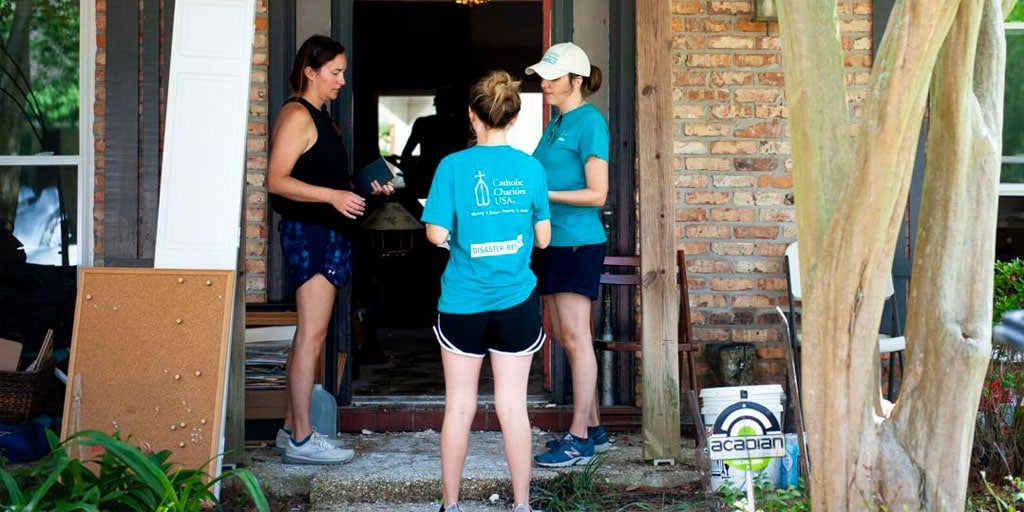

After the 2016 flood, Denise Brown donated time and money to the recovery effort.
Five years later — on the heels of a storm that doused the capital region in 14 inches of rain, flooding her out of house and home — the 39-year-old Jefferson Terrace resident is the one who needs help.
And on Saturday, the Catholic Charities Diocese of Baton Rouge was there to give it.
In an outreach effort that kicked off early in the day, a team of volunteers and staffers from the nonprofit handed out 5-gallon buckets with gloves, bug spray and cleaning supplies for flood victims in Jefferson Terrace and Meadow Park Avenue.
Brown lit up as the Catholic Charities Disaster Response Team approached her house, where family members were carrying away soaked furniture and garbage bags. She welcomed volunteers to her gutted home, which she jokingly described as being forcefully redesigned into an “open-concept” style.
“It’s hard to receive charity because I’m more of a person that gives,” she said. “But I’m so overwhelmed, so I’m allowing myself to receive and just be thankful. I’ll definitely be attending Mass to say my prayer of thanks.”
The aftermath
The deluge this past week left hundreds of Baton Rouge residents without cars, homes or personal belongings. In Jefferson Terrace, where many homes lack flood insurance since the area rarely sees that much water, entire streets were inundated. In those two areas alone, Catholic Charities’ team of eight volunteers handed out about 100 buckets of supplies.
“This is an unexpected-type flood,” C.J. Roy, Catholic Charities’ financial coordinator, said while out in the field Saturday. “People are never going to be prepared for it, and they’re always going to have some needs that aren’t covered by insurance or personal resources, so we want to try to get ahead of the curb.”
Brown said she had no idea that the rain would be so severe Monday night. She said her family didn’t realize it had begun flooding until her husband looked out the window and saw waves rolling up to their front door as a car stalled out while trying to drive through floodwater.
Hers was one of five houses on the street to flood. At its peak, the water rose up to her mailbox.
“Me and my son collect sports cards together,” Brown said. “We happened to be going through them before the flood, so they were on the ground. They all got ruined — probably decades’ worth of collections.”
Brown said her roughly 50-year-old house had never flooded before. Still, she said she has experience with flooding and dedicated time and money to help others in the wake of the 2016 floods.
“I didn’t realize the impact that I made in 2016,” Brown said. “But being on the other end now, it’s just every little thing so far to help us has been very emotional.
“I’m trying to document everyday who stops by so I can write thank-you notes.”
More help on the way
Though the buckets they handed out weren’t enough to solve all the flood victims’ problems, volunteers also asked what else they needed, taking down names and numbers so Catholic Charities can reach out later with resources for home repair, alternative housing, counseling and more.
Director of Disaster Operations Lisa Lee, who coordinated the volunteer program, recalled meeting one woman Saturday who needed to find new housing for her and her husband, who has dementia.
“When we walked in (to her home), that mold smell already set in and hit you,” Lee said. “That was really hard. That’s when I really realized what this family is going through, and now we really need to see what we can do to help her.”
Lee said many people they visited mentioned not having flood insurance or car insurance, and that the financial burden of cleaning their homes was the most overwhelming factor for them. Supply chain disruptions, rental car demand and labor shortage due to COVID-19 have already put strains on costs and availability for temporary vehicle replacements and home repairs, thus eliminating many of the options that would normally be available for flood victims.
“This is just the very first part of it,” Roy said. “It takes months and months, maybe a year, to recover, and at that time people are still going to have unmet needs when something else might come up.”
Tina Lawrence, 69, lived in her home for 34 years and never experienced flooding before. Though she had already invested in flood insurance, she pointed to five neighbors’ houses that said they were not insured. She was grateful that the organization had offered their assistance to her, but she asked that the buckets be brought to those in more need.
“I’m grateful I don’t need it,” Lawrence said. “But I’m more grateful it’s available.”
Lawrence expressed concern for how her neighborhood will handle the upcoming hurricane season, as subtropical storm Ana became the first named storm of the hurricane season Saturday despite hurricane season typically not starting until June at the earliest.
“The fifth season is upon us,” Roy said. “People need to review their game plans, and if they don’t have a game plan they need to get a game plan.”
[This article is used with permission from Kelly P. Kissel, Metro Editor, The Advocate – www.theadvocate.com – where it appeared originally (See here). Many thanks to Lara Nicholson, the writer of the article, and to Alyssa Berry, the photographer, for covering the work of Catholic Charities.]








